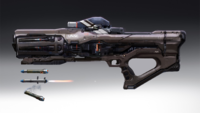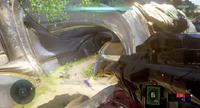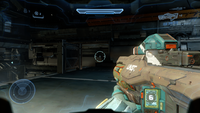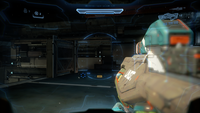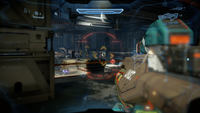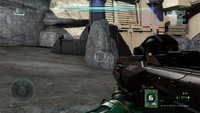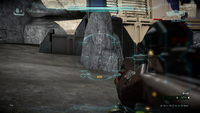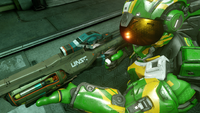MLRS-1 Hydra
From Halopedia, the Halo wiki
| MLRS-1 Hydra | |
|---|---|
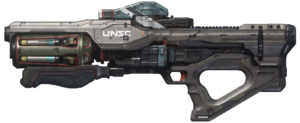
| |
| Production overview | |
|
Manufacturer: |
|
|
Model series: |
|
|
Type: |
|
|
Variants: |
|
| Specifications | |
|
Length: |
|
|
Width: |
14 centimeters (5.6 in)[1] |
|
Height: |
38 centimeters (15.1 in)[1] |
|
Weight: |
11.0 kilograms (24.3 lb)[1] |
|
Ammunition type: |
|
|
Feed system: |
|
|
Firing mode: |
|
| Service history | |
|
In service: |
|
The Multiple Launch Rocket System-1 Hydra Gyroc Launcher (MLRS-1 HGL) is a rapid-fire guided munitions launcher in the Hydra line of weaponry manufactured by Chalybs Defense Solutions and used by the United Nations Space Command.[1][2] It is the predecessor to the MLRS-2 model.
Overview
Design details
The MLRS-1 Hydra Gyroc Launcher is a highly versatile guided missile launcher that can operate in a variety of different environments. The weapon was designed to be effective against both infantry and vehicle targets. The Hydra is designed to be as easy to operate as a conventional rifle, albeit one that fires gyroscopically stabilized High-Explosive Air Bursting (HEAB) micro-missiles from the weapon's six-chamber, revolving cylinder.[1] The Hydra's rockets are capable of homing in on targets, though they require a lock-on before doing so.[3][2]
Highly effective in both close-quarters combat and medium-range engagements, the Hydra can be used in a direct-fire mode, though it is most deadly when using a real-time VISR connection to lock-on and guide missiles to the target. The Hydra's sophisticated automatic targeting and tracking system allows the user to target not only individual infantry, but even distinct parts of enemy vehicles to effect a clean and efficient kill.[1][2]
Variants
- Typhon: The Typhon is an improved variant manufactured by the Office of Naval Intelligence's Watershed Division that features upgraded and improved recoil compensation, warhead damage, and reload speed.[1][4]
- Echidna: The Echidna is an advanced variant, also produced by the Watershed Division's engineers, that features experimental, non-nuclear warheads capable of generating an electromagnetic pulse. Unlike the base model or Typhon, the Echidna is capable of both a 2× and 5× zoom and can track down targets as far back as 2,040 feet (622 m).[1][5]
Operational history
The result of decades of development in refining micro-missile technology, the Hydra MLRS entered service in the United Nations Space Command in 2556, though the weapon has yet to see widespread usage beyond the Spartan branch as of October 2558. The Hydra had been utilized in a number of combat roles, including close-quarters infantry engagements, urban pacification, and ship boarding maneuvers.[1] Hydras were aboard Argent Moon during Blue Team's mission to recover the research ship in 2558.[6]
Trivia

|
See our gameplay information related to MLRS-1 Hydra on its gameplay page. |

|
Browse more images in this article's gallery page. |
- In Episode 6 of The Bulletin, fans were given the opportunity to vote for which weapon they wished to be featured in the Halo 5: Guardians Multiplayer Beta: the Hydra or the rocket launcher. The Hydra won the vote.[7]
- In Greek mythology, the Hydra was a large serpent-like water monster that possessed multiple heads.
Gallery
Normal gallery
Concept art of the Hydra for Halo 5: Guardians.
A Recruit-clad Spartan-IV wielding the Hydra in a promotional image for the Halo 5: Guardians Multiplayer Beta.
A Spartan-IV using smart scope with the Hydra.
The Hydra being used on the map Regret.
First-person view of the Hydra by Frederic-104 in the Halo 5: Guardians campaign.
Fred-104 locking onto Kig-Yar Rangers with his Hydra.
Fred-104 with a Hydra on Argent Moon.
Jameson Locke using a Hydra on Sanghelios.
A Spartan-IV using a Hydra on Escape from ARC.
Concept art of Commander Jerome-092 with a Hydra for Halo Wars 2.
An MLRS-1 Hydra in the hands of Taylor "Dutch" Miles.
Halo 5: Guardians REQ cards
List of appearances
- Halo 5: Guardians (First appearance)
- Halo Wars 2
- Halo: Legacy of Onyx
- Halo: Official Spartan Field Manual
Sources
- ^ a b c d e f g h i j k l m n Halo Waypoint, Hydra Launcher (Retrieved on Oct 30, 2021) [archive]
- ^ a b c d e f g h i Halo Encyclopedia (2022 edition), page 177
- ^ Halo Waypoint, Canon Fodder - Locke & Load (Retrieved on Nov 8, 2020) [archive]
- ^ Halo 5: Guardians, REQ card: Typhon description "What Chalybs builds, Watershed Division perfects. Improved Hydra Launcher with upgraded recoil compensation, warhead damage, and reload speed."
- ^ Halo 5: Guardians, REQ card: Echidna description "Experimental mini-missile warheads are just one of Chalybs Defense's many R&D projects. Advanced Hydra Launcher loaded with experimental EMP warheads capable of temporarily disabling enemy vehicles."
- ^ Halo 5: Guardians, campaign level Blue Team
- ^ Halo Waypoint, The Halo Bulletin Episode 6 (Retrieved on Apr 13, 2016) [archive]
| |||||||||||||||||||||||||


